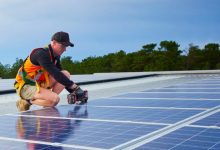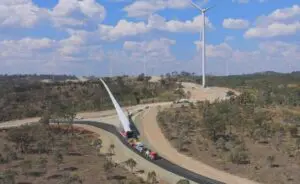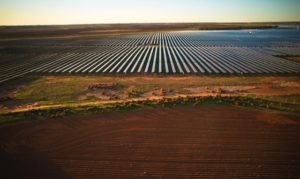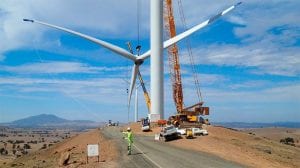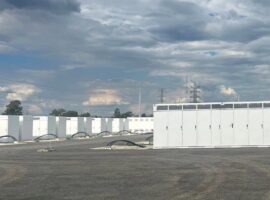It hasn’t taken much time for the Coalition government to dump everything it said was dear to its ideology in the face of Covid-19. Budget surpluses gone, Newstart allowances boosted, even the nationalisation of airlines is not ruled out.
But rather than simply throw money at the problem, economic experts are wondering why the government doesn’t start to think more strategically and creatively about where the money should go, and how to deploy a workforce with nothing much to do. One of the obvious answers, say economists from The Australia Institute, is in sustainable infrastructure.
Have you ever swum in any of those tidal pools along the Sydney shoreline? Turns out many of them were built at the time of the Great Depression. Some 90 years later, these are assets that are still being used by many Australians. It’s time to think what else could we build or do now which will have benefits down the line.
Matt Grudnoff, an economist at TAI, suggests one idea could be installing rooftop solar on public housing.
“All of the government initiative so far have had no secondary benefits. It’s just about giving people and business money,” Grudnoff tells RenewEconomy. “It’s not thinking in a creative way at all.
“If you put solar panels on public houses, you deliver a secondary benefit of lower bills, for decades to come. You could solar hot water, or energy efficiency.
“With so much idle capacity, the government doesn’t just need to give money to business – it needs to get businsess to do things. They are only limited by their imagination.”
Other examples were green carbon projects, particularly in bushfire affected areas, and on “blue carbon” (ocean) and costal restoration, using old car manufacturing facilities to focus on battery manufacturing, and electric car parts, and extending the roll out of electric car charging infrastructure.
Beyond energy and transport is the possibility of redeploying the numbers of scuba-divers – now out of work due to the drop off in tourism on the Great Barrier Reef – to focus on a massive eradication program of Crown of Thorns starfish.
In regions affected by bushfires, there is plenty of work to be done – such as eradicating pests, restoring walking tracks.
One thing that might be blocking their thinking is the so-called “pink batts” controversy from Labor’s response to the global financial crisis, and the big deal that conservatives made about cheques being mailed to “dead people”. Yet exactly the same problem is possible now that the government is emailing cheques to all pensioners.
“We have got to get something out of this, because the economic crisis is going to last a lot longer than the health crisis,” Grudnoff says. “The government seems to assume that the economy will rebound straight away. But I don’t think that will happen, we need to get something out of what we do now, because the impact is going to last a lot longer.
The chief economist at TAI, Richard Dennis, says it is important to understand that Australia is not experiencing a cyclical downturn in the economy, it is experiencing an unprecedented structural change in the entire shape of the economy.
“This is the first time that a government has gone into a slowing economy deliberately trying to slow down economic activity,” he said at a press briefing in Canberra which was attended by a single camera operator. (TAI later sent out a transcript).
“We have to close down our tourism industry. We have to close down large parts of our transport industry. Usually at a time like this, we would be stimulating economic activity wherever and however we can.
“Because we are not in a period of cyclical decline and because we have entered a structural change in the economy, thanks to coronavirus, the government needs to move on from being targeted and temporary in the design of stimulus. And it’s time for them to look at things structural and sustained in developing new interventions.
We need to base our economic decisions on the science. We know that this is going to last six months minimum as a health epidemic and we know the economic consequences are going to last, will beyond that.
So, while the timely expenditure of stimulus is welcome, we are encouraging the government to stop designing a package that is far bigger in scale that is structural design and then sustain in its roll out. Unless the government does that, the bridge its starting to build now will not make it nearly far enough.
“The design of fiscal policy can’t be based on the values of the Treasurer or the Prime Minister. The design of the stimulus needs to be based on the needs of the economy.”
Fatih Birol, the head of the International Energy Agency, made the same point last week when he said governments stimulus plans should focus on the “essential” task of building a secure and sustainable energy future.
“Large-scale investment to boost the development, deployment and integration of clean energy technologies – such as solar, wind, hydrogen, batteries and carbon capture (CCUS) – should be a central part of governments’ plans because it will bring the twin benefits of stimulating economies and accelerating clean energy transitions,” Birol said.
“The progress this will achieve in transforming countries’ energy infrastructure won’t be temporary – it can make a lasting difference to our future.”
Birol also said the stimulus plans could be used to remove some $400 billion of annual fossil fuel subsidies, and boost energy efficiency initiatives.
“Governments can use the current situation to step up their climate ambitions and launch sustainable stimulus packages focused on clean energy technologies. The coronavirus crisis is already doing significant damage around the world. Rather than compounding the tragedy by allowing it to hinder clean energy transitions, we need to seize the opportunity to help accelerate them.”

